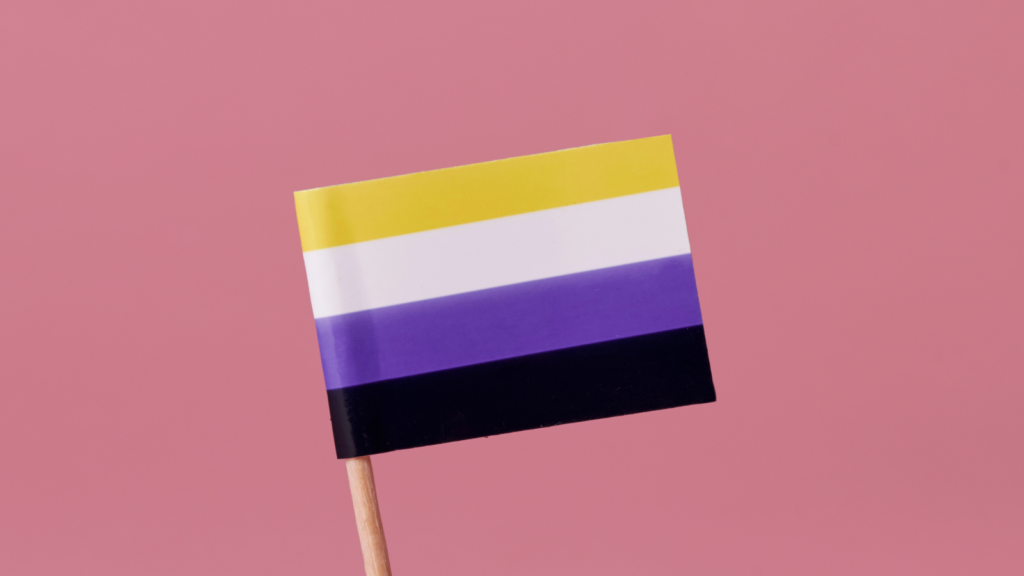
July 14 each year is International Non-Binary People’s Day. A day to raise awareness and celebrate Non-Binary people. When it comes to the workplace, the use of pronouns and respectful language is an area where organisations can create a safe environment for all employees. Kath Sciacca, former Member Relations Manager at DCA, shared their lived experience below.
Hi, I’m Kath and I’m the Member Relations Manager here at DCA.
For me, when I start at a new workplace, not only do I have to learn about my new role, I also must learn to navigate how I can safely show up as me in my new workplace.
For the last 2 years, I’ve mainly used the pronouns they/them, so you’d likely think that when I got asked to provide my pronouns when starting at DCA, that it would have been an easy thing to answer. But alas, it was not.
For me, when being misgendered, correcting people is hard, but what is harder is the unknown response or reaction I’ll receive from the person I am correcting. Will they make me feel bad? Will I need to apologize? Will I need to make sure they are ok, for getting my pronouns wrong?
When accidental misgendering occurs, the best thing to do in the moment is correct yourself and simply move on. If someone brings it to your attention either the person you misgendered or someone else, thank them for letting you know and move on. Much like you would do in a scenario where you use the wrong name for someone. If you referred to Sandra as Sally in a conversation and someone corrected you, you wouldn’t respond with “I am trying but it’s just so hard to remember her name, so I will probably get it wrong on occasions’. So, if you do ever find yourself using the incorrect pronoun for someone remember to keep in mind that if you draw unnecessary attention to it, you may be invertedly creating an uncomfortable space for the person you misgendered.
In response to the pronoun question, I decided to put they/she and instantly felt uneasy about it. I felt like I was betraying myself, but I did it because I didn’t know what to expect. In past workplaces I had found that I was the one having to do the educating and that the workplace didn’t have internal measures in place to educate staff on pronouns and inclusive language. I had to accommodate others to protect my psychological safety. Which is why it’s not always a simple question to answer, especially when starting somewhere new.
On my first day at DCA, I had a casual chat and a cup of tea with our CEO, Lisa. During our chat, Lisa’s genuine and welcoming nature made me feel instantly safe in her presence, so much so that I found myself telling her about how I regrettably put down ‘they/she’ pronouns for use here at DCA. Immediately, without hesitation she told me I did not have to do that and that if I ever encountered any issues, she would support me.
Professional me, I made sure to stay composed, I sipped my peppermint tea and politely thanked her. Every day I think about that interaction and how instead of sipping tea and politely thanking her, I wanted to cry happy tears and dance around the room.
No matter the journey you are on, when it comes to respecting people’s pronouns, you don’t need to understand it all to be respectful. I get that it might feel weird sharing your pronouns, however I like to remind people that while it lets others know how to refer to you, the greater impact is that it helps to create a safer space for others to share, especially those that have faced situations where it is not safe to do so.
It also helps to normalize using pronouns and removing the association and connection of them with gender expression. You really can’t judge a book by its cover. Every individual has a story, and every individual has the right to express themselves as they wish. Society assigns gender to clothes, names, styles etc. So, by sharing your pronouns, it helps remove and challenge the thought process of, ‘Oh I don’t need to share my pronouns, it’s obvious I use she/her pronouns, because my name is Mary and I have long hair and I wear pink skirts’. Unless you wear a badge saying what your pronouns are, it’s not obvious.
So please, I encourage you to share your pronouns, anywhere you share your name. Written or verbal. Because for me, when I see someone or hear someone sharing their pronouns, it’s like morse code for ‘you can be you, with me, without fear.’
My experiences and feelings are mine and I would never speak for anyone else or claim that all experiences are the same, but I do think it’s fairly safe to say that feeling included, feeling accepted and seeing others make an effort without having to ask, is universally something everyone hopes for and deserves.
DCA’s D&I Insights Program event Reimagining Binary Workplaces examined how workplaces can be more inclusive of non-binary employees. Post-event update and resources, including the event recording, are available.
General Resources
This is a selection of additional resources and information:
- International non-Binary People’s Day
- BlaQ Aboriginal Corporation
- LGBTQIA+ multicultural community groups and services in NSW
- SwitchBoard Victoria
- Transcend Australia
- The Gender Centre
- Beyond Blue – Families Like Mine
- Parents of Gender Diverse Children
- TransHub
- Read – The Pronoun Lowdown by Nevo Zisin
- Read – Sock Drawer Heroes – Varous Books
